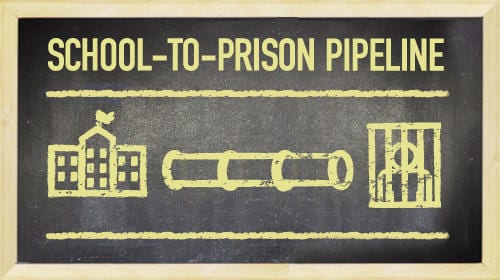Happy New Year from the Ohio Supreme Court! Mandatory Waiver Provisions for Kids to Adult Court Violates the Constitution (State v. Aalim, Slip Op. No. 2016-Ohio-8278). Time to fix this injustice in SC, too!
Time to make this happen in South Carolina, too! One feature of the insidious School to Prison Pipeline is that, pursuant to statutes like the one we have in South Carolina, see below, kids who are charged with certain felonies are automatically waived up to Big People Court. That is, they’re treated like adults, even though they’re still obviously children. The Ohio Supreme Court, in an opinion issued December 22, 2016, has found those automatic waiver provisions to be unconstitutional under the Federal Constitution. It’s time to raise precisely this same challenge in South Carolina.
In this case, the child, who was 16 years old at the time, was alleged to have committed an aggravated robbery. He had essentially a preliminary hearing in juvenile court after which the court found that there was probable cause to believe he had committed the crime. He was then mandatorily waived up to Big People Court. After plea negotiations, he pleaded guilty and received 4 years in prison.
He was allowed to appeal his conviction and raise this challenge on direct appeal. In South Carolina, a direct appeal under these circumstances would not be allowed since it was a facially valid plea. But also, this kid’s appeal was what our courts would consider “a conditional plea” which means he pleaded guilty, but reserved the right to raise the issue on appeal. The issue this kid raised on the appeal was whether the waiver provisions of the Ohio statute violate juveniles’ rights to due process and equal protection. Oral argument was heard in April 2016. The decision was just issued.
Importantly, in the opinion, Justice Lazinger found that “[Kids] age should not be treated as the sole decisive factor in determining whether they are transferred for criminal prosecution…[kids] must have individual consideration at amenability hearings before being transferred from the protections of juvenile court to adult court upon a finding of probable cause for certain offenses.”
Then,
“The mandatory-transfer statutes preclude a juvenile court judge from taking any individual circumstances into account before automatically sending a child who is 16 or older to adult court. This one-size-fits-all approach runs counter to the aims and goals of the juvenile system, and even those who would be amenable to the juvenile system are sent to adult court. Juvenile court judges must be allowed the discretion that the General Assembly permits for other children. They should be able to distinguish between those children who should be treated as adults and those who should not.”
This finding fully comports with the United States Supreme Court’s evolving Doctrine of Youth that has been under way for the past decade. Specifically, in Miller v. Alabama, 567 U.S.__ (2012) the Court found three important differences between kids and adults– Children have a “lack of maturity and an underdeveloped sense of responsibility”; children are more vulnerable to negative influences and outside pressures; and a child’s character is not as “well formed” as an adult’s and his actions are less likely to be “evidence of irretrievable depravity.”
Here’s the applicable statute in South Carolina that exempts kids from the definition of “kids” if they’re charged 16 or older and charged with certain crimes:
“‘Child’ or ‘juvenile’ does not mean a person 16 years of age or older who is charged with a Class A, B, C, or D felony … or a felony which provides for a maximum term of imprisonment of 15 years or more.” S.C. Code Ann. § 63-19-20.
So, great work in Ohio on this critically important issue. I think South Carolina criminal lawyers should be raising challenges like the one made here at every single opportunity. In fact, our firm, along with other like-minded lawyers, is exploring the possibility of raising this challenge on behalf of all similarly situated defendants, just like we did in Aiken v. Byars, 410 S.C. 534, 765 S.E.2d 572 (2014) It’s time to shut down the School to Prison Pipeline, and this is a worthy target.

